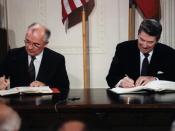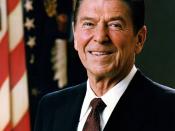The surprisingly peaceful implosion of the Communist regime in the Soviet Union is one of the most significant events in history. The world literally went from a nuclear shelter mentality to the rapture of peace in a matter of days, and the credit goes to President Reagan of the United States and President Gorbachev of the Soviet Union. Their having come into office at approximately the same time - Reagan in 1981 and Gorbachev in 1985 - and having had much the same world view is a remarkable and historic coincidence, one of those surreptitious and fortuitous accidents of history.
President Ronald Reagan, a man most renowned for ending the Cold War - a war that had divided the world for almost 5 decades - assumed a different road to peace than his predecessors. On March 20, 1981, the president claimed: "We've come to a turning point. We have a decision to make.
Will we continue with yesterday's agenda and yesterday's failures, or will we reassert ours ideals and our standards, will we reaffirm our faith, and renew our purpose? This is a time for choosing." He wanted to begin an "era of national renewal." He followed a policy of economic pressure in addition to the ongoing deterrence policy*. This paper will address how Ronald Reagan used the Soviet Union's economic weakness in an effort to bring the Communist regime to an end; for when he came into office his objective was "to find the weak points in the Soviet Structure, to aggravate the weaknesses, and to undermine the system."
These two leaders were similar in many ways. Most important, each leader saw hope in working with the other. They were both willing to try different approaches to ending the war. Both leaders wanted to change the way foreign policy...


